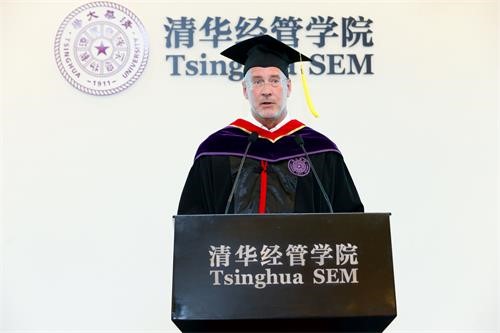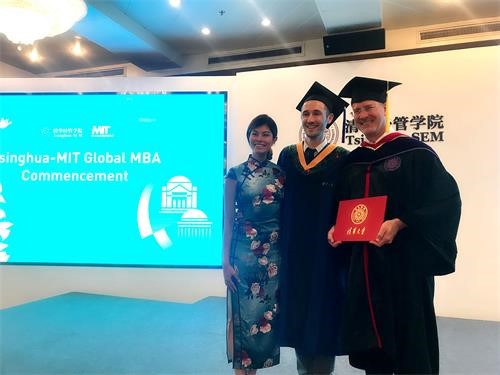Parents, guests and soon-to-be graduates. I am deeply grateful for the opportunity to be part of this ceremony celebrating the culmination of your two years of blood, sweat, tears, hopefully mixed with a good amount of joy, fun and new friendships.

Professor Steven White
At this point, what can I say to you? I’ve enjoyed having all of you as my students—you couldn’t escape me your first semester. I love captive customers! And I hope you’ll never forget the “focal user”, and the value of “small data”!
Like all of your professors, I tried to give each of you something useful. You came from different places, and are heading to others. But here is my chance to leave one parting message, and I hope it might be useful for every one of you.
Become a craftsman.

Professor Steven White with students
Huh? When I say “craftsman”, you probably think of woodworkers, or potters. Maybe electricians or plumbers. Or maybe a sushi chef, if you’ve seen “Jiro Dreams of Sushi” (寿司之神). You may be thinking, “What does this have to do with us MBA graduates? This isn’t a vocational program.” But that’s too limited a notion of “craftsman”.
Maybe I need to define what I mean by “craftsman”:
A person who has deep knowledge in a field, a context. Who has insights, and generates more new insights, into that topic. Who can use that to do things that others can’t, to ask and answer questions that others can’t. In Chinese, the common phrase is匠心, that emphasizes the attitude and values, or “spirit”, of a craftsman.
Let me make a clear distinction with a very different concept that we hear a lot as so-called “real” advice for MBAs. “Fake it till you make it.” That is actually good advice from psychotherapy, and for some things. It’s also called “act as if…”. For example, if you’re shy in networking events, act like someone who is outgoing. If you do it enough, with enough practice, then you’ll probably become better at networking. Or, if you feel unhappy a lot of the time, smile like someone who is happy. So-called “smile therapy”. And you’ll probably become a bit happier.
That’s seems to be pretty useful for changing behaviors and feelings. But it’s not so good when you need deep expertise and skills. Faking it, or acting like you have it, and even believing you have it, is not enough. If you stop there, you’ll eventually be caught as a fraud.
Becoming a craftsman takes work. Takes time. A lot of time.
If you were a firm, your “craft” would be your “strategic core”. Your craft will be part of your future success if it meets these VIRO criteria, that you may have come across in your strategy courses.
1. Valuable. It gives you some value in the marketplace, it gives you an advantage over your competitors.
2. Inimitable. It’s hard to imitate. Because it’s complex, not simple. Because it takes a lot of time and effort to develop. Most people can’t replicate it.
3. Rare. Few others have it. And most other people can’t, or won’t, be able to reach the same level of craftsmanship.
4. Opportunity. You are one of the best at this craft, AND put yourself in positions where you can leverage, and deepen, your craft.
So, I ask you: What is your career’s strategic core? What is your “craft”?
Some of you are lucky. You’ve already identified it, and have already started deepening your skills and expertise in your craft. Keep it up!
Others of you are still searching, or should be. That’s O.K! Finding itt will take time. And you won’t find it by “objective analysis”, like through one of those self-assessments that identifies your “passions”. It will emerge, usually slowly and before you even notice. Probably after you have “kissed a lot of frogs”, as they say. After many different experiences, trials. Maybe you’ll find it in your 20s, and hopefully by your early 30s.
How will you know when you’ve found your craft? You might not be really good at it, especially at first. Don’t expect to find what you’re “naturally good at”—craftsmen are not born. They have worked hard at it for a long time. And a lot longer than the oft-quoted 10,000 hours—that just gets you to “functional”, not to “craftsman” level.
You’ll know what your craft is in a few ways. First, you don’t mind working at it, even if it’s not easy for you, and even if you feel frustrated sometimes. Next, you like to read about it, learn more about it, even if you’re not being paid to read or learn more about it. And you like to talk about it, especially with others who love the same craft. Later, you’ll know it’s your craft when others come to ask your advice about it. Because you’re one of the few people—a craftsmen in your field—who can give really good advice, insights, or help them with a hard problem, in that area.
We professors hope that we have played a role in this process. Not just to give you generally useful tools and insights. But to have helped you explore, find or deepen your craft. The rest is up to you, to continue on your path to becoming a true craftsman in your chosen field.
My best wishes to you on this journey.
 Latest News
Latest News